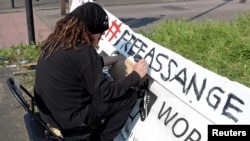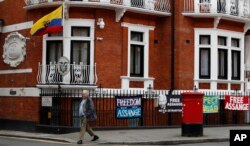Julian Assange's supporters have assembled a powerful legal team to try to block the founder of the cyber-hacking site WikiLeaks from being extradited to the United States, following his arrest in London last week.
Among them are lawyers who recently defeated U.S. efforts to extradite other hackers from Britain in prolonged legal hearings or who have defended clients in high-profile human rights cases.
WikiLeaks, the secret-spilling website which has focused most of its attention on the U.S. and Western countries, has been preparing a war chest and is aiming to raise hundreds of thousands of dollars to defend Assange, who is wanted in the U.S. on hacking offenses.
The extradition request from the U.S. came last week after the 47-year-old Australian was stripped of his diplomatic protection by the Ecuadorian government and British police were invited into Ecuador's embassy, where he had been provided with sanctuary for the past seven years, to arrest him.
Assange, who is seen by his supporters as a whistleblowing hero but by his critics as being at best a dupe of the Russian government and at worst an active agent of influence,' jumped bail in Britain in 2012 during court hearings to avoid extradition to Sweden, where he was wanted for questioning on rape and sexual assault allegations.
His long drawn-out defense against the Swedish extradition request ended up going all the way to Britain's Supreme Court and is estimated to have cost about $20 million.
Manning has been in jail since March 3, when a federal judge found her in contempt for refusing to testify in front of a grand jury investigating WikiLeaks. The grand jury has been probing WikiLeaks since 2010 when it started publishing hundreds of thousands of diplomatic cables and confidential information Manning leaked to Assange on the wars in Afghanistan and Iraq, as well as diplomatic memos.
Much of the material wasn't redacted and the lives of confidential sources have been imperiled by the en masse leaking, to the fury of U.S. intelligence officials.
As British government lawyers and Assange's defense counsel started to draw up the legal battle lines Monday, security camera footage of Assange's behavior in the Ecuadorian embassy was published by Spanish newspaper El Pais.
Assange's supporters say the Ecuadorian government's action of inviting the British police into the embassy to arrest him was unlawful and they dispute claims about anti-social behavior. Ecuadorian officials have accused Assange of bullying staff and security guards and of being unsanitary and slovenly, failing to flush the toilet, to clean up after himself and of leaving dirty laundry scattered about.
One of his lawyers, Jennifer Robinson, said Sunday, "Ecuador has made these allegations to justify the unlawful and extraordinary act of letting police come inside the embassy."
In the footage leaked to El Pais, which reveals the deteriorating relations between Assange and embassy workers, the hacker is seen skateboarding and angrily confronting one of the guards when the guard insists that Assange's late-night visitors leave the building. The guests only left in the early hours of the morning apparently when the ambassador arrived and demanded their departure.
Assange was initially welcomed at the embassy when he skipped bail in 2012, but that changed when the Ecuadorian presidency changed from Rafael Correa to Lenin Moreno. The latter has moved away from his predecessor's populist leftism to adopt more social democratic and centrist policies.
Ecuadorian officials, including Moreno, are continuing to insist they had no choice but to evict Assange as he had turned the embassy, they say, into a "center for spying."
In an interview with Britain's The Guardian newspaper, Moreno said, "We cannot allow our house, the house that opened its doors, to become a center for spying."
WikiLeaks document releases concerning the Vatican were among those thought to have angered Moreno. He was also upset when the WikiLeaks founder used his Twitter account to post messages of support for Catalan independence and accused the Spanish government of repression. Moreno told Assange he had no reason to interfere in the politics "of nations that are our friends."
WikiLeaks also released documents purportedly showing Moreno had secret bank accounts and hidden wealth. Moreno has said Assange violated the terms of his asylum.







